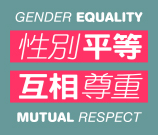Gender Equality
| Sexual harassment is an abuse of power that often occurs in a relationship of unequals. While hierarchy may be unavoidable in any organizational settings including universities (involving for example teacher-student, supervisor-staff), hierarchy should never be related to gender, and must never be abused. There is the need to promote mutual respect among members of different social groups, especially between members of different genders, and to minimize the undesirable effects arising out of unequal relationships. This may require people in various positions to reflect on their cultural preconceptions and practices. Such positive acts include but are not limited to the following: |
||
| a) | Teaching staff (including teaching assistants) should avoid the use of remarks that have the effect of demeaning or stereotyping members of a certain gender in a classroom setting. Such sexist remarks should also be avoided by supervisors toward those they supervise, workers toward their colleagues, and students toward their peers in their day-to-day interaction and student activities. Common examples of sexist remarks include: |
|
| i) | portraying women as sex objects or as being less motivated in career pursuits; | |
| ii) | stereotyping men or women's aptitude in certain subjects or types of work; an | |
| b) | Instructional/supervisory staff should treat students/workers of both genders equally, as should students toward their peers. This includes: |
|
| i) | giving equal attention to the views of male and female students/workers/peers in a group discussion; | |
| ii) | responding to their comments with equal attention; and | |
| iii) | giving them equal chances to voice their views. | |






